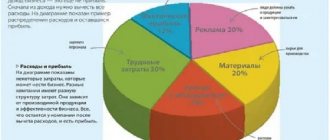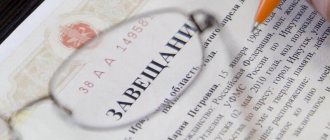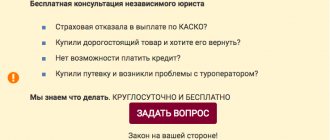My grandfather died and in order to begin to resolve the issue with the property, it was necessary to find out whether there was a will and what was indicated in this document. First, I turned to the notary at my grandfather’s place of residence, but there was nothing there, however, there are more than one notaries in our city and I had already planned a trip to other notaries, when a friend advised me to check the will in the registry online.
It turned out that in order to prevent conflict situations, the occurrence of various errors and deception that arise when conducting such cases, a database was formed. The main convenience of using such a service is that if there is a will, every citizen can find out within a short time and without searching for information about the inheritance through notaries. In general, I turned to an online service to search for a will and received all the necessary information very quickly. Let's talk about this in the article.
The essence of the work of the unified notary information system
The database of inheritance cases is an archive of data that contains all the information about inheritance cases that have entered the system through an accredited notary office. In this database you can find information about open inheritance cases, registered wills that have not yet entered into force, about potential heirs, and other information.
Depending on the circumstances of a particular situation, the user can search the register according to the data of the testator, heir or notary. Information about the composition of the will cannot be obtained if it has not entered into force. A testamentary document comes into force only after the death of the testator. Access to the registry database can be obtained by a limited number of persons.
The necessary information may not be available on the portal servers if the testator did not contact the notary office to register the document, enough time has not passed to update the data, or the will was drawn up before the certain time period from which the register began its work.
Questions from our readers
Can third parties find out about the existence of a will?
Only a relative of the deceased can submit a request for the last will. Information can be obtained from any notary, since a unified database of all administrative documents drawn up in Russia is maintained.
But it is recommended to contact the official at the last place of residence of the testator, since it is he who will open the inheritance case.
Third parties can only learn about the last declaration of will if they are mentioned in it. This is possible after opening a probate case. The responsible person must take measures to notify everyone mentioned in the document if he has information about their place of residence or work.
Unified register of wills and inheritance cases in the Unified Information System
The wills database contains information about all changes occurring in each specific inheritance case that has been officially registered. When a will is entered into the database, information about potential heirs who may lay claim to the property is also placed there. In the future, these heirs can be found using the service.
When the inheritance has come into force and the heirs have formalized their legal right to it, the notary responsible for conducting a particular case makes adjustments to the database. It takes time for changes to appear correctly in search results.
Why is a registry needed?
The register is intended for:
- Facilitating the search for heirs and testators.
- Simplification of the procedure for identifying testamentary documents.
- Obstacles to illegal transactions with inherited property and papers.
Thanks to the database, it became possible to obtain information on inheritance cases in an interregional format. Now you can find out about the inheritance in advance, even if the testator lived in a remote region of the Russian Federation.
To whom it concerns
Having a common notary database is useful for:
- Testators.
- Heirs.
- Notary employees.
- Government agencies.
- Courts and bailiffs.
Each of the listed entities may submit a request to the registry for individual reasons, depending on the circumstances of a particular situation.
Verification methods
In this case, it is necessary to check the copies of the will kept by the testator and the notary. Usually there are only 2 of them, or 3 when creating an inheritance fund (in the second option, two copies are kept by the notary). There should be no discrepancies between them. In the future, you can check the accuracy using unified databases and open registries.
Checking a will for inheritance through the registry
The Federal Notary Chamber has a so-called unified register of inheritance cases (unified database). Here, a notary or other responsible person identified on the basis of legislation enters all information as a result of the opening of a will (after the death of the testator). The information is presented in the public domain. To search for a case regarding the testator of interest, you should indicate his full name and date of life.
The service allows you to check information only by full name without indicating dates of birth and death. However, the system will most likely display a whole list of testators with that name. For each of them, the date of death will be displayed (which makes it easier to find if you have an approximate idea of this) and the number of the probate file.
Information for each testator contains information about the notary. In this case, it is possible to go to the page to search for the notary chamber in which he works. Contact information will contain information on telephone numbers, addresses, mailboxes and geolocation marks on the map (most likely the testator has contacted the nearest notary at his place of residence).
Such a register or unified database is useful not only for heirs, but also for notaries themselves. Upon receipt of an application for claims to inheritance and the issuance of a certificate of such right, the notary can check the availability of inheritance cases in the database. Applications can come from different heirs independently of each other and to completely different notaries. Secondary requests are attached to an existing case.
As for the initial safety of information about a newly drawn up will, this operation is carried out in the electronic register of wills or the unified wills database of the UIS. It is useful, among other things, for searching for wills and restoring them in the event of loss or damage, as well as for verifying documents provided by applicants for inheritance. In the latter case, it can be checked for unreliability.
Unlike the previous database, the unified register of wills of the EIS is intended for more convenient functioning of the notary office, namely for collecting, organizing and processing information. Therefore, access to the unified UIS register is closed to the general public. You can use the register together with a specialist by coming to an appointment at the notary’s office (for example, to obtain a certificate of inheritance).
Verifying the validity of a will using an independent examination
If any of the participants in the inheritance case has doubts about the executed testamentary disposition, then a handwriting examination can be ordered. It is worth remembering that the legislative framework allows it to be written by another person if it is impossible for the direct testator to do so (due to health problems) if there is his personal signature or the signature of another person authorized to do so.
How to check for reality based on Art. 1125 Civil Code of the Russian Federation:
- If the testator, due to health problems, is deprived of the opportunity to independently record the text of the will, then this is carried out by a person appointed by him in the presence of a notary (with the testator’s signature on the document).
- If, at the same time, he cannot even put his signature under the text written by someone else, then this function is also performed by an appointed person, indicating the reasons for such circumstances, as well as the personal and contact information of the signatory.
The persons authorized to sign should be checked on the basis of Art. 1124 GK:
- a notary or other person certifying the document;
- the presumptive heir, as well as his spouse, children and parents;
- other incapacitated or illiterate citizens;
- citizens who do not speak the language in which the will is drawn up.
The notary himself can express doubts about the sincerity of the text and the authenticity of the person preparing it. Often in such situations, he refuses the service even before registration. Sometimes it is also important to initiate a criminal case on his initiative if certain fraudulent facts are revealed (for example, forgery of a will). Then you can check the document using an examination during the investigation period.
As for the sanity of the testator, it is worth checking it in the framework of medical reports by applicants for the inheritance in advance. Declaring a loved one incompetent after his death is extremely difficult without documentary evidence of this fact. Sometimes the notary himself requires the provision of relevant certificates before the procedure.
The procedure for establishing the validity of a document through court
If the heir was able to independently verify the will, this fact is not a basis for cancellation after discovery. To challenge it, you will have to initiate legal proceedings, in which the fact of fraudulent actions on someone’s part will be proven. The subject of invalidity of a will is regulated by the Civil Code, namely Article 1131.
How to check the authenticity of a will. Invalidity options:
- recognition of it as such by a court - a contestable will;
- an insignificant will - one that does not require the court to grant it such status.
The nullity test does not occur on the basis of fraudulent actions. How to check this fact? If the document is drawn up with gross violations of the form, the will of the author is written incomprehensibly, or it contains false information about the participants and the property being transferred, then such a will is considered invalid. An uncertified form has the same characteristics.
Contestation must be carried out by filing a claim by a person whose rights are not taken into account or are directly violated. These are both persons appearing and absent from the will. The limitation period depends on the basis for filing the application and is a maximum of 3 years.
Protests are different: failure to take into account in the will the obligatory share due to a relative (for example, the allocation of property to a disabled spouse), cancellation of part or the whole will for the distribution of inheritance according to the law (the law identifies heirs from the first to the seventh priority), criminal method of registration, etc. The plaintiff will also have to provide documents confirming the claims.
Online check
Any citizen can check information in the unified automated databases of government agencies. To do this, you do not need to visit the offices of the relevant institutions. Information accessibility online is currently promoted by each of them. An example is the considered unified register of inheritance cases and the register of wills.
Also, every single Code of Russia, which is available on the Internet, is open to citizens. Here you can find information about the rules for drawing up a will and the procedure for its implementation. Based on this, non-compliance with legal standards is identified. The form does not have a unified format, but it is not prohibited to compare the available copy with standard samples presented on the Internet.
How to find out information about inheritance
The search for a hereditary file is carried out on the official website of the registry. The resource interface contains tools that allow you to use data of various categories for searching. Depending on the information entered, the system displays what is associated with it. The wider the search parameters, the greater the likelihood of finding the desired case.
Access to information in the Unified Information System
Obtaining information about inheritance matters is not subject to any government fees. The database covers all regions of the Russian Federation, and you can access it from anywhere in the country. You do not need to have special authority or permission to access the system.
Who can receive information about the opening of a case?
Any citizen can obtain information from the register. The amount of data to which he will have access is limited only by the search criteria specified by him, as well as the stage at which a particular case is located. Detailed information about the inheritance - its contents and cost - is not available to casual users. To view it, you must have the appropriate credentials.
Outsiders
Outsiders who have a certain amount of information about the inheritance case may receive a limited list of data on a specific case. They have access to the following:
- Notary dealing with the issue;
- Case number;
- Certificate number;
Additional information may be provided to unauthorized persons at the notary office upon confirmation of authority.
Can relatives find out?
Notary employees have access to the full volume of data on inheritance cases. If relatives want to find out everything about the will, they need to personally visit the notary office and prove the existence of family ties with the testator. To do this, they submit the relevant official documents. Only after this can the notary give them access to the details of the case.
Information at the request of state and municipal authorities
Employees of state and municipal bodies also have the opportunity to receive information about inheritance cases. To do this, they do not need to confirm the presence of family ties. It is enough just to certify your state status. employee and provide the reasons for the request. Upon application from a civil service representative, the notary can issue an official document containing all the information that can be used in courts and during other procedures.
How to use the service
The database of inheritance cases of the Russian Federation contains a full range of information about each inheritance case that was entered into the register. The search can be carried out using the identification data of the testator or heir - full name. It is also possible to find the data of the participants in the case by the name of the notary.
How to find out if the deceased left an inheritance
To find out about the inheritance or lack thereof, you must enter information about the potential testator. If he applied to the notary for honoring the inheritance document, and enough time has passed, data about this will be entered into the database. The user will not receive complete information, but will learn whether there is an official will.
Nuances you need to know when entering data
It is worth considering that the system can sometimes provide information on several cases at once. This is due to the similarity in the surnames and first names of citizens. To avoid mistakes, it is necessary to check the number of the certificate of inheritance rights with the case number and the required identification data.
If a will is not found
If the testator has died and there is no data about the will in the system, this may be due to several reasons:
- The information on the service has not yet been updated;
- Errors were made when filling out the case and when entering search parameters;
- The testator did not apply to the notary for certification of the document.
In the latter case, the will may be present even if the notary has not certified it. In this case, it is probably compiled on paper and stored somewhere in the testator’s personal belongings.
How they used to look for inheritance cases
Before the advent of the register, the ability to search for information on inheritance matters was limited. It was necessary to contact the notary office in which the testator executed the will. In big cities this created problems, since the number of notary offices there is large. The search could become more complicated if the testator registered the document not at the place of permanent registration, but in the region of temporary residence or at the location of the object of inheritance.
With the development of a unified registry, the search process has been simplified. Any citizen who has up-to-date information and appropriate powers can obtain information on a specific inheritance matter.
Searching for inheritance cases by the last name of a deceased person: where is the online service located
The service, convenient for heirs, is located on the FNP website, in the “Useful information” or “Reference” section (you can click on any of them). On the portal page that opens ]]>notariat.ru]]> “Search for inheritance cases” will be listed first at the top in the right column. Below it are other online services of the Federal Notary Chamber, for example, helping to find heirs or verify the authenticity of a power of attorney.
You can also go to the online service for searching inheritance cases by ]]>direct link]]>.
The heir believes that his rights have been violated: where to go
If, using the notary's register, the heir finds out that his rights have been violated, he has the opportunity to address this issue to the court or the police. How the issue is resolved will depend on the circumstances of the particular situation and the status of the violations identified.
In some cases, the heir may find out that the period for vesting rights has already passed, but he was not aware of the will. In this case, he has the right to initiate restoration of the deadlines through judicial proceedings. During the process, he must prove that the reasons for the delay were valid.
Should a notary search for heirs without fail?
The law establishes that a notary has the right to search for heirs at his own request. But this is not the direct task of the lawyer who executed the will. He may not search - no punishment is provided for this.
Even if a notary is searching for heirs, he only has the right to send appropriate notifications . He is not obliged to verify that it was received.
Important! The main task from the point of view of the Civil Code is to notify, if possible, heirs who are known. Those that are not known to him may remain ignorant.









